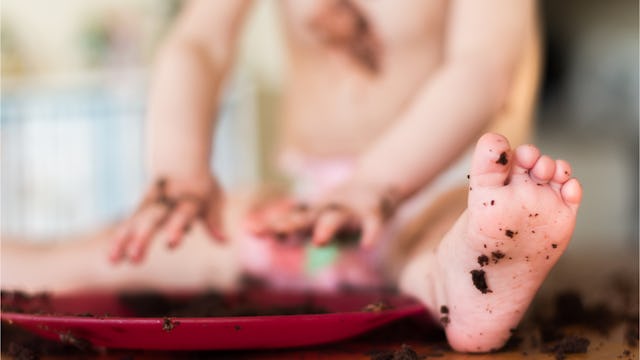Science Says: Let The Kids Get Messy

All parents have been there. You sit the kid down in the high chair. Give them some food, and suddenly if feels like the whole dining room is coated in a mix of oatmeal, Cheerios, and something that looks like it used to be yogurt, but now, you aren’t sure. My youngest is 3, and although she’s got the food-eating thing mostly mastered, I’m still finding residue from when she learned to eat in the far-off crevices of my home.
Turns out, however, that sitting in the high chair and making a mess of things is actually, and unfortunately, how toddlers increase their vocabulary. Researchers at the University of Iowa decided to study how 16-month-old children develop language skills from nonsolid objects such as oatmeal and glue. What they found is that if you put a toddler in a familiar setting — for this study they used the high chair — and give them nonsolids, they learn the names of nonsolids faster.
In a paper published in the journal Developmental Science, Larissa Samuelson, associate professor of psychology at the University of Iowa, along with a group of researchers, exposed several 16-month-olds to 14 nonsolid objects. They mostly used food and drinks, anything from applesauce to pudding to juice. The children dove into everything they could, because, well, toddlers. They threw the food, mashed it, rubbed it into every available crevice — they probably did everything but actually eat it.
The study found that the “toddlers who interacted the most with the foods were more likely to correctly identify them by their texture and name them.”
Naturally, there’s more to it. But ultimately the study found that when your young one is in a recognizable place, and making a huge mess with food, they are actually learning more than just how to eat. They are learning how to identify textures and associate them with a name. In fact, the messier the child gets, the more they are learning, which is yet another example of how parenting is the ultimate no-win situation.
As a father of three, I will be the first to admit how frustrating this is to hear. Just the thought of one of my children eating as a toddler makes my eye twitch. I’d rather find out that the parents who fought their children every inch of the way to be cleaner while eating ended up with smarter children. But naturally that isn’t the case. It’s the messy ones who learned the most, and the quickest.
“It may look like your child is playing in the high chair, throwing things on the ground, and they may be doing that, but they are getting information out of (those actions),” Samuelson says. “And, it turns out, they can use that information later. That’s what the high chair did. Playing with these foods actually helped these children in the lab, and they learned the names better.”
So those of you with toddlers cheerfully tossing applesauce at the walls or cramming pasta into their diaper, realize it’s going to take you a hell of a long time to find all of that mess. I know this from experience. But also take comfort in knowing that your child is actually learning a lot from the mess. It might seem like they are laughing and smiling while cramming food in their nose out of spite — or at least that’s how I felt about it. But it turns out they might simply be enjoying all the knowledge they are gaining.
The study doesn’t go into other messes, mind you. Taking every toy out of the toy box and throwing them at siblings wasn’t studied, nor was sneaking into the Tupperware drawer to clean it out, or throwing all the vegetables out of the crisper and then smashing them on the kitchen floor (all examples were experienced by the author). But chances are, that’s all part of the learning experience too. It seems to me that all the toddler messes, every single one, are part of the learning process. The messier the kid, the more curious they are.
As a father, I didn’t really need science to tell me this. However, I will admit that it’s good to know that the next time someone comes to my house and notices dried spaghetti sauce on my wall, I can pull out a scientific study to defend the mess.